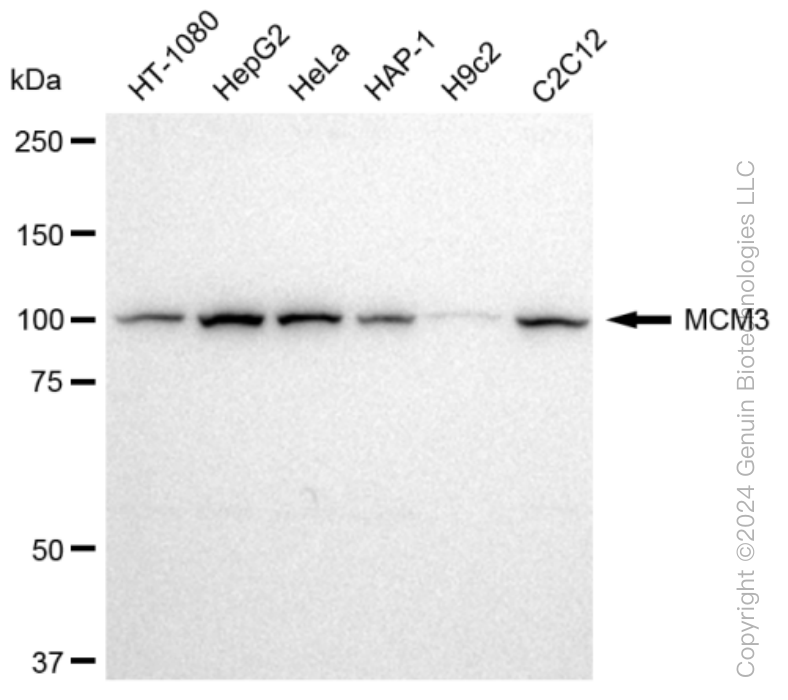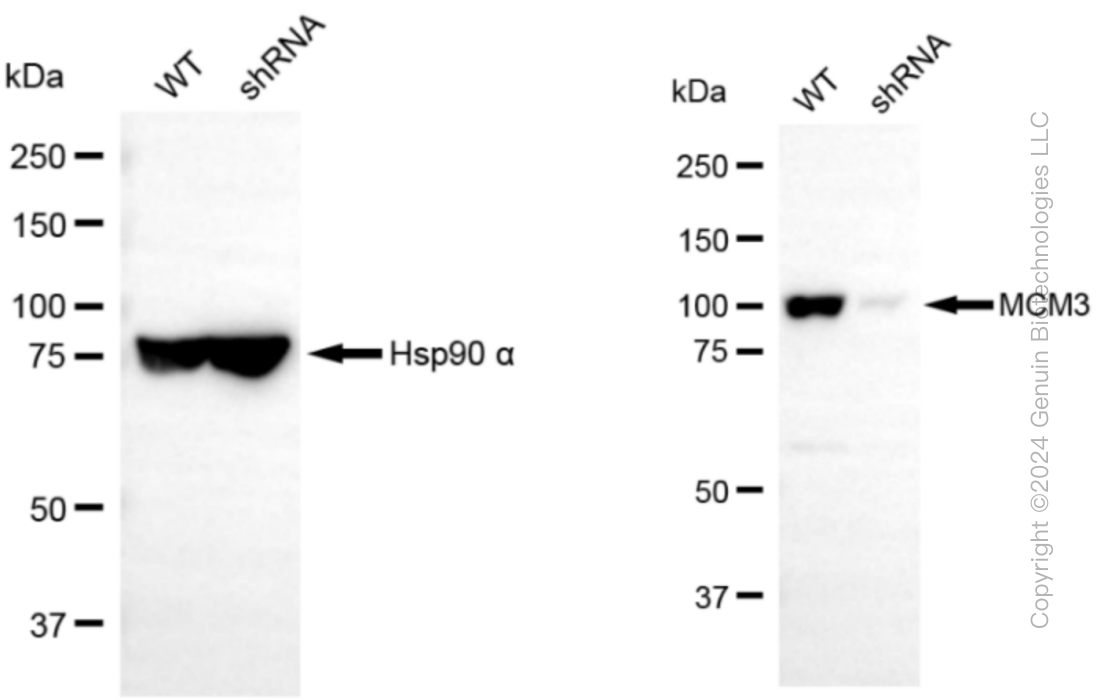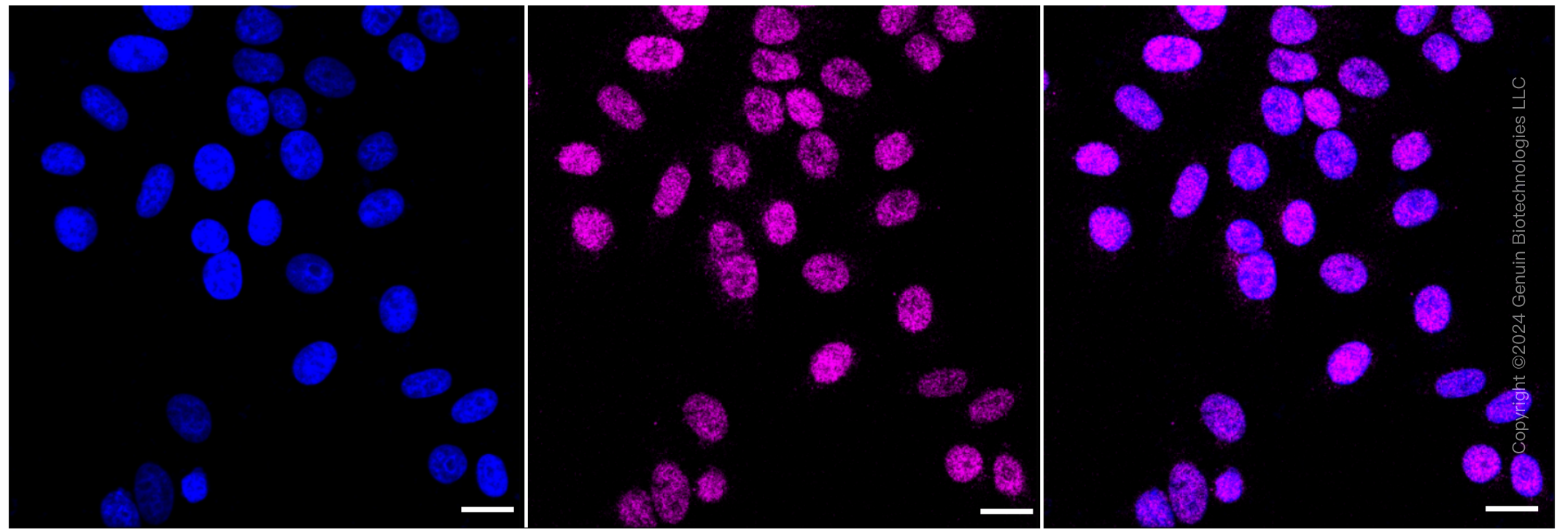KD-Validated Anti-MCM3 Rabbit Monoclonal Antibody
Rabbit monoclonal antibody
- SPECIFICATION
- CITATIONS
- PROTOCOLS
- BACKGROUND

Application
| WB, ICC |
|---|---|
| Primary Accession | P25205 |
| Reactivity | Rat, Human, Mouse |
| Clonality | Monoclonal |
| Isotype | Rabbit IgG |
| Clone Names | 23GB 2490 |
| Calculated MW | Predicted, 91 kDa , observed, 100 kDa |
| Gene Name | MCM3 |
| Aliases | MCM3; Minichromosome Maintenance Complex Component 3; DNA Polymerase Alpha Holoenzyme-Associated Protein P1; DNA Replication Licensing Factor MCM3; RLF Subunit Beta; P1-MCM3; P102; MCM3 Minichromosome Maintenance Deficient 3 (S. Cerevisiae); Minichromosome Maintenance Deficient (S. Cerevisiae) 3; MCM3 Minichromosome Maintenance Deficient 3; Replication Licensing Factor, Beta Subunit; Minichromosome Maintenance Deficient 3; Cervical Cancer Proto-Oncogene 5; DNA Replication Factor MCM3; HRlf Beta Subunit; EC 3.6.4.12; HCC5; P1.H; RLFB |
| Immunogen | A synthesized peptide derived from human MCM3 |
| Gene ID | 4172 |
|---|---|
| Other Names | DNA replication licensing factor MCM3, 3.6.4.12, DNA polymerase alpha holoenzyme-associated protein P1, P1-MCM3, RLF subunit beta, p102, MCM3 (HGNC:6945) |
| Name | MCM3 (HGNC:6945) |
|---|---|
| Function | Acts as a component of the MCM2-7 complex (MCM complex) which is the replicative helicase essential for 'once per cell cycle' DNA replication initiation and elongation in eukaryotic cells. Core component of CDC45-MCM-GINS (CMG) helicase, the molecular machine that unwinds template DNA during replication, and around which the replisome is built (PubMed:32453425, PubMed:34694004, PubMed:34700328, PubMed:35585232). The active ATPase sites in the MCM2-7 ring are formed through the interaction surfaces of two neighboring subunits such that a critical structure of a conserved arginine finger motif is provided in trans relative to the ATP-binding site of the Walker A box of the adjacent subunit. The six ATPase active sites, however, are likely to contribute differentially to the complex helicase activity (PubMed:32453425). Required for the entry in S phase and for cell division (Probable). |
| Cellular Location | Nucleus. Chromosome. Note=Associated with chromatin before the formation of nuclei and detaches from it as DNA replication progresses. |

Thousands of laboratories across the world have published research that depended on the performance of antibodies from Abcepta to advance their research. Check out links to articles that cite our products in major peer-reviewed journals, organized by research category.
info@abcepta.com, and receive a free "I Love Antibodies" mug.
Provided below are standard protocols that you may find useful for product applications.
If you have used an Abcepta product and would like to share how it has performed, please click on the "Submit Review" button and provide the requested information. Our staff will examine and post your review and contact you if needed.
If you have any additional inquiries please email technical services at tech@abcepta.com.














 Foundational characteristics of cancer include proliferation, angiogenesis, migration, evasion of apoptosis, and cellular immortality. Find key markers for these cellular processes and antibodies to detect them.
Foundational characteristics of cancer include proliferation, angiogenesis, migration, evasion of apoptosis, and cellular immortality. Find key markers for these cellular processes and antibodies to detect them. The SUMOplot™ Analysis Program predicts and scores sumoylation sites in your protein. SUMOylation is a post-translational modification involved in various cellular processes, such as nuclear-cytosolic transport, transcriptional regulation, apoptosis, protein stability, response to stress, and progression through the cell cycle.
The SUMOplot™ Analysis Program predicts and scores sumoylation sites in your protein. SUMOylation is a post-translational modification involved in various cellular processes, such as nuclear-cytosolic transport, transcriptional regulation, apoptosis, protein stability, response to stress, and progression through the cell cycle. The Autophagy Receptor Motif Plotter predicts and scores autophagy receptor binding sites in your protein. Identifying proteins connected to this pathway is critical to understanding the role of autophagy in physiological as well as pathological processes such as development, differentiation, neurodegenerative diseases, stress, infection, and cancer.
The Autophagy Receptor Motif Plotter predicts and scores autophagy receptor binding sites in your protein. Identifying proteins connected to this pathway is critical to understanding the role of autophagy in physiological as well as pathological processes such as development, differentiation, neurodegenerative diseases, stress, infection, and cancer.




